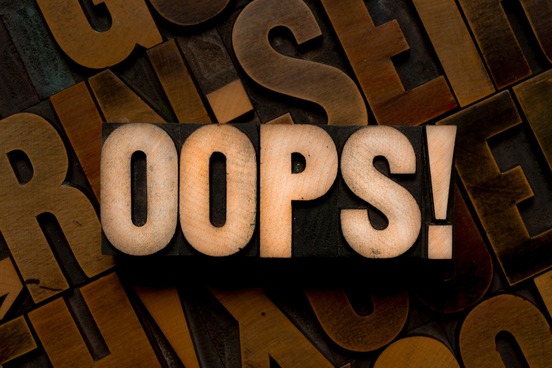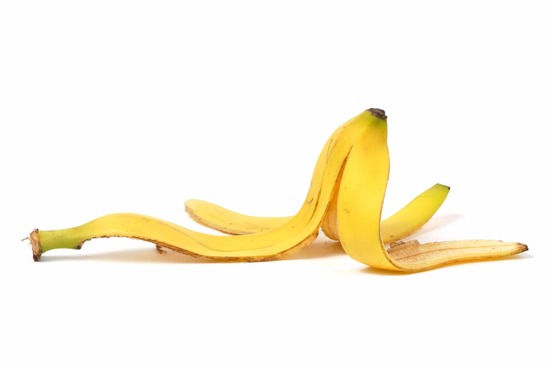
Lapsus calami
Definition:
: slip of the pen
Counted as error was any departure from conventional orthography, whether an apparent misspelling, lapsus calami, or mistake in grammar: "existance" in place of "existence," "loots" in place of "tools," "it's" in place of "its" (this category of error subsumes the errors in possessive formation, above).
— Richard H. Haswell, Written Communication, October 1988
Ah, the lapsus calami that made me type teh when I meant the. As Internet communication proves daily, lapsus calami, though Latin for "slip of the pen," requires no pen for full functionality.
The lapsus here is the same word that gave us the word lapse, which refers, among other things, to a slight error typically due to forgetfulness or inattention. The Latin word calamus means "reed" or "reed pen," and calami is translated as "of the pen." (The lapsus calami is not to be confused with the lapsus linguae—a slip of the tongue.)

Gaffe
Definition:
1 : a social or diplomatic blunder
2 : a noticeable mistake
The gaffe that we apply to mistakes and blunders of various kinds was borrowed from French but likely has its origins in the argot of sailors. Herman Melville introduces the probable linguistic ancestor of the modern word—gaff—in this somewhat stomach-churning account of the goings-on in a whaling ship's blubber room:
But to learn all about these recondite matters, your best way is at once to descend into the blubber-room, and have a long talk with its inmates. This place has previously been mentioned as the receptacle for the blanket-pieces, when stript and hoisted from the whale. When the proper time arrives for cutting up its contents, this apartment is a scene of terror to all tyros, especially by night. On one side, lit by a dull lantern, a space has been left clear for the workmen. They generally go in pairs,—a pike-and-gaff-man and a spade-man. The whaling-pike is similar to a frigate's boarding-weapon of the same name. The gaff is something like a boat-hook. With his gaff, the gaffman hooks on to a sheet of blubber, and strives to hold it from slipping, as the ship pitches and lurches about. Meanwhile, the spade-man stands on the sheet itself, perpendicularly chopping it into the portable horse-pieces. This spade is sharp as hone can make it; the spademan's feet are shoeless; the thing he stands on will sometimes irresistibly slide away from him, like a sledge. If he cuts off one of his own toes, or one of his assistants', would you be very much astonished? Toes are scarce among veteran blubber-room men.
We did warn you.
From the blubber room, gaff moved on to other job sites, including those frequented by loggers and butchers. It also enjoyed less messy nautical applications having to do with sails and pennants. We won't blame the professionals, but somehow along the way, gaff also developed meanings synonymous with hoax and fraud, as well as gimmick and trick. It also came to be used to refer to something painful or difficult to bear, and to persistent criticism or teasing. (Those latter developments we can imagine taking root in that blubber room, but we won't venture back there again.) Gaff at this point was centuries old, but it appears that our modern word gaffe dates only the early 20th century, when it was borrowed from French where it had both the "boat hook" meaning and an informal meaning of "blunder."

Slipup
Definition:
1 : mistake
2 : mischance
Colleges invest millions in their athletic programs and aren't about to let social-media slipups bring them down.
— Sean Gregory, Time, 22 Oct. 2012
Before there were slipups, there were simply slips: mistakes in judgment, policy, procedure; unintentional or trivial mistakes or faults. And before there were such slips there was another slip of a kind familiar to people who are familiar with boats. Slip in this sense refers to a sloping ramp, especially one made of stone, that extends out into the water far enough to serve as a landing place for ships. The development of a word's various meanings is rarely simple, and the nautical meaning of slip, while being a relation of the "mistake" one, also developed other nautical meanings over the centuries, referring, for instance, to a ship's or boat's berth between piers. The "act or instance of slipping" meaning is also related to these senses of slip, which means that an etymological investigation of a slipup on a slip resulting in a slip into water is simpler than such a similarly complex phrase might otherwise be.

Flub
Definition:
: an act or instance of flubbing : an act or instance of botching or making a mess of something : blunder
He saw he'd inverted two letters, which he's been doing a lot of lately, one of many signs there's something growing on his brain, and he elevated the page and whited out the mistake, then had to wait while the liquid dried. How he punished himself for repeated errors at the machine, eternal misfingering, how typing mistakes became despair, meaningless flubs bringing a craze to his eyes, and he stared at the white fluid drying and would not resume work until it faded into the page, which was both the punishment and the escape.
— Don DeLillo, Mao II, 1991
Sometimes the English language births an excellent word seemingly ex nihilo. And so it is with flub. We don't know where it came from—either the noun or the verb, for one can certainly flub in addition to making flubs—but there is compelling evidence that it is American in origin, and that it dates to around the turn of the 20th century. The dearth of information about its history gives it a mysterious air dissipated only by the asininity of its phonetics.

Clinker
Definition:
1 : a serious mistake or error
2 : an utter failure : flop
But the product has to live up to those expectations or it will join the ever-growing list of clinkers, flops, and duds.
— Robert M. McMath, American Demographics, June 1997
Clinker is a contronym—that is, a word having two meanings that contradict one another. One of those meanings is not common: in British English clinker can (or perhaps "could for a time" is more accurate) refer to something first-rate. It's more common meanings, however, are nothing to emulate.
A musician will tell you a clinker is a wrong note played. A baseball player will tell you it's a dropped ball. An actor will tell you it's forgotten lines. They all speak the truth. Clinker likely comes from the verb clink, which does not aspire to such complexity. It's satisfied to be simply onomatopoeic, meaning only what it sounds like: "to give out or cause to give out a slight sharp short metallic sound." (Another etymologically unrelated word clinker refers to a brick that has been burned too much in the kiln and to stony matter fused together.)

Brick
Definition:
: gaffe, blunder — used especially in the phrase drop a brick
I accompanied my friend on a visit to her acquaintance. The lady was all dressed up and made up, though at home and we got to talking about vegetarianism. "Since my husband went I don't buy meat," she said. "That's good," I said, "even when he comes back, keep it that way," I smiled, not knowing she was a widow and thinking her husband was away on some business trip. I knew I had dropped a brick when my friend nudged me and the lady said "Well, err... my husband is no more."
— Priya Manilal, Alive, 3 July 2012
And speaking of bricks. They're heavy and people are likely to notice—and possibly object—when you drop them. The phrase drop a brick appears to be a 20th century invention, which means that it is preceded by a 19th century phrase alluding to a brick as a kind of hidden accessory. While the connection between the two phrases is purely speculation, it seems a speculation well made: if "to have (or wear) a brick in one's hat" is, as the Oxford English Dictionary reports it to be, a euphemism for being intoxicated, the blundering dropping of the brick is surely the fault of the hat.

Miscue
Definition:
For every success—crisp sweetbreads surrounded by mustard greens, their nutlike flavor enhanced by a tangy mustard caper sauce, or a mache salad, the leaves as tender as baby cress, with sweet striped beets and little chunks of smoky sturgeon—there is a miscue.
— Eric Asimov, The New York Times, 26 June 2002
Before a miscue was a simple slip or mistake, it was a very particular kind of error: a faulty stroke in billiards in which the cue—the tapered stick used to strike the cue ball—slips. It's not a miscue to use the word either way.

Bug
Definition:
: an unexpected defect, fault, flaw, or imperfection
Today's heroes are the computer debuggers, who, for heroic fees, fly the world with their stethoscopes to rescue multinational corporations which have been reduced to impotence by one wrongly written line of computer code. And everybody knows about the calendar bug which threatens to prevent us even reaching the next millennium.
— Christian Tyler, The Pittsburgh Post-Gazette, 4 Jan. 1998
We do not know why insects are (somewhat informally) called bugs but we do know why the unexpected computer problems that sometimes inspire great cursing and banging at computer keyboards are—and that particular etymology involves entomology.
Admiral Grace Hopper is credited with the coinage. Hopper, a mathematician, Navy rear admiral, and a pioneer in developing computer technology, was working at Harvard one night in August 1945 when there was a problem with one of the circuits of the computer she and her team were working with. The problem, it turned out, was a two-inch moth—a literal bug. The moth was successfully extracted with a pair of tweezers, and the term bug was successfully implanted in the language as a term for those occurrences that remind us that computers are not really on our side at all.

Blooper
Definition:
: an embarrassing public blunder
The international date line is a metaphysical and geopolitical blooper—it's the place where imperialist nineteenth-century Europe, otherwise unimpeded in its quest to shrink-wrap the world, found it had to pull out the Scotch tape.
— Nancy Princenthal, Vogue, June 1989
While most bloopers can happen anywhere, some bloopers happen only on a baseball field. The term refers both to a high pitch lobbed to the batter with backspin and to a weakly hit fly ball hit barely beyond the infield. But bloopers didn't begin with baseball. The term blooper first applied to a radio receiving set that misbehaved—if causing nearby radio sets to make a loud, unpleasant "bloop" sound counts as misbehaving—by generating a current of radio frequency that caused radiation from the receiving antenna resulting, sometimes, in a bloop from neighboring sets. Oops.





